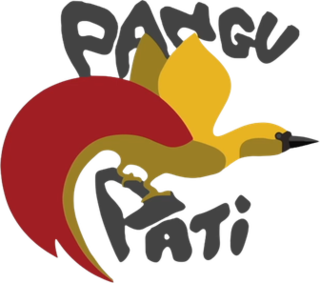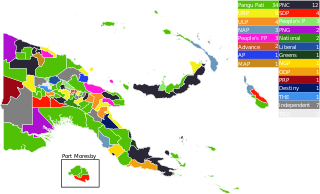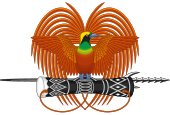
Papua New Guinea, officially the Independent State of Papua New Guinea, is a country in Oceania that comprises the eastern half of the island of New Guinea and its offshore islands in Melanesia. It shares its only land border with Indonesia to the west and it is directly adjacent to Australia to the south and the Solomon Islands to the east. Its capital, located on its southern coast, is Port Moresby. The country is the world's third largest island country, with an area of 462,840 km2 (178,700 sq mi).

The politics of Papua New Guinea takes place in a framework of a parliamentary representative democratic multi-party system, whereby the prime minister is the head of government. Papua New Guinea is an independent Commonwealth realm, with the monarch serving as head of state and a governor-general, nominated by the National Parliament, serving as their representative. Executive power is exercised by the government. Legislative power is vested in both the government and parliament.

Sir Julius Chan is a Papua New Guinean politician who served as Prime Minister of Papua New Guinea from 1980 to 1982 and from 1994 to 1997. He is Member of Parliament for New Ireland Province, having won the seat in the 2007 national election. He is also the current Governor of New Ireland Province, since 2007. On 26 May 2019, Prime Minister Peter O'Neill announced he would soon resign and that he wished for Sir Julius to succeed him. An outgoing Prime Minister does not, however, have the power to appoint his successor, and the following day O'Neill delayed his own formal resignation. He was also a leading figure in his country during the years-long Bougainville conflict.

The Pangu Pati, officially Papua na Niugini Yunion Pati, is a nationalist and developmentalist political party on the centre-left in Papua New Guinea. The party is the oldest political party in Papua New Guinea and has held all levels of government throughout its history. As of 2023, it is the largest party in the National Parliament.

The People's National Congress is a political party in Papua New Guinea. Its former leader Bill Skate served as Prime Minister from 1997 to 1999 and as speaker of Parliament from 2002 to 2004. Skate died in 2006 and the party was led by Peter O'Neill until 2022. PNC originated from the National Capital District where former leader was the Governor of NCD and the Parliamentary Member. The party had 16 members in the 113-seat National Parliament of Papua New Guinea as of December 2022.

Chimbu, more frequently spelled Simbu, is a province in the Highlands Region of Papua New Guinea. The province has an area of 6,112 km2 and a population of 376,473. The capital of the province is Kundiawa. Mount Wilhelm, the tallest mountain in Papua New Guinea is on the border of Eastern part of Simbu and the Western part of Madang Province.

The National Parliament of Papua New Guinea is the unicameral national legislature in Papua New Guinea. It was created in 1964 as the House of Assembly of Papua and New Guinea but gained its current name after the nation was granted independence in 1975.
Sir Christopher Seseve Haiveta is a Papua New Guinean politician.

Bernard Mullu Narokobi OBE was a Papua New Guinean politician, jurist, and philosopher. He was serving as the Papua New Guinean High Commissioner to New Zealand prior to his death. Between 1987 and 1997 he represented his Wewak Open Electorate as a Member in the Papua New Guinea's National Parliament. During his time as a Member of Parliament (MP), he served as the Minister for Justice (1988–1992) in the government led by the then Prime Minister Rabbie Namaliu; Agriculture Minister (1992–1994) under the leadership of Prime Minister Sir Julius Chan led government; and Leader of the Opposition from July 1997 to 1999, and Speaker of the National Parliament of Papua New Guinea, until he lost his seat to the then Wewak MP Kimson Kare during the 2002 elections. He was displaced as a minister in the Chan government for failing to vote in favour of constitutional reforms in the provincial system of government.

Don Pomb Polye is a Papua New Guinean politician from Enga Province. He has been a Cabinet Minister under two Prime Ministers, and was briefly Deputy Prime Minister from July to December 2010. He has held Foreign Affairs, Immigration, Transport, Civil Aviation, Finance and Treasury portfolios.
Sali Subam is a Papua New Guinea politician. He was a National Alliance member of the National Parliament of Papua New Guinea from 2007 to 2012, representing the electorate of South Fly Open.

James Marape is a Papua New Guinean politician who has served as the prime minister of Papua New Guinea since May 2019. He has been a member of the National Parliament of Papua New Guinea since July 2007, representing the electorate of Tari-Pori Open in Hela Province in the New Guinea Highlands. He has held Cabinet Posts as Minister of Education (2008–2011), Minister of Finance (2012–2019), and Minister of Foreign Affairs (2023–present). Marape entered the 2022 elections under the banner of the Pangu Party and won more seats than any other party. He was therefore entitled to form the government. His new government was elected unopposed by the new parliament.
The Papua New Guinea Labour Party was a political party in Papua New Guinea.
The Papua New Guinea Country Party is a political party in Papua New Guinea. It was founded in 1974.

Sir Puka Temu,, is a Papua New Guinean politician. He has been a member of the National Parliament of Papua New Guinea since 2002, representing the electorate of Abau Open. A former Deputy Prime Minister under Michael Somare, he is part of Prime Minister James Marape's government as a member of the Our Development Party.
Sir John Pundari is a Papua New Guinean politician. He has been Speaker of the National Parliament (1997–1999), Deputy Prime Minister (1999), Minister for Foreign Affairs (2001), and currently serving as the Minister of Finance and Rural Development since 20 December 2020.
The Papua New Guinea Greens Party or PNG Greens are a minor political party in Papua New Guinea. Founded in 2001, the party took part in the 2002, 2007, 2012 and 2017 general elections, without winning a seat. They are a member of the Global Greens and of the Asia Pacific Greens Federation.
This is a list of members of the National Parliament of Papua New Guinea from 1997 to 2002, as elected at the 1997 election.
This is a list of members of the National Parliament of Papua New Guinea from 1992 to 1997, as elected at the 1992 election.

General elections were held in Papua New Guinea from 4 to 22 July 2022 to elect the members of the National Parliament for a new five-year term.











